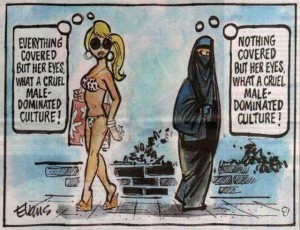Feminista: perspectives on modern feminism

Last week, I saw a picture online of a woman in a bikini and a woman in traditional Islamic dress. They were both looking at each other in disgust over the other’s clothing. Both of them were repulsed by how much a male-dominated culture dictated what the other wore.
I have seen many of these arguments emerge since France’s decision to outlaw any kind of face veil. This includes the hijab, a full body garment with a slit in the face for the eyes, as well as the burqa, which has a mesh screen over the face, making the woman impossible to see from the outside.
While Italy had a preexisting law stating that facial coverage was not allowed for security reasons, France was the first country to specifically target Muslim women.
Women who refuse to comply with the ban may be fined up to $215 and risk the embarrassing public removal of their clothing.
Some Westerners, even feminists, were excited about this new law. This is largely because we misunderstand the reasons for covering oneself in public.
In our society, women are told to dress to impress. I think we all know we are not trying to impress our girlfriends but men.
Our ideas of beauty come directly from what we think men find appealing in a woman.
So, when we look at a Muslim woman with her body, or at least her air and her arms covered, we assume that she is being suppressed in some way.
While I am not trying to say that this is not perhaps true in some cases, there is a much more delicate understanding of foreign gender constructs that gets lost in quick judgment.
In Massachusetts, I had a dear friend who chose to wear a hijab.
When I asked her why she did so, she told me it had nothing to do with protecting herself from the wandering eyes of men that she did not trust. Rather than being a superimposed rule, it was a personal choice to protect her modesty—not a means of male control.
In the West, if we see a nun in public, we do not chastise her for covering her hair or her body. She is simply a holy woman, dressing in a way that she deems virtuous.
Why should it be different for a devout Muslim woman?
The reality is that there is not much of a difference in the reasons why these women highly value their modesty.
I think that there needs to be some greater effort, by feminists and by all people, to understand the way that gender constructs function in other parts of the world.
Ripping off someone’s hijab does nothing but humiliate and dehumanize them by assuming that they cannot make their own decisions.
Muslim women are not children. We cannot and should not force Western ideas of acceptable dress upon them.
The best way to be rid of the male-dominated ideas of both the bikini and the burqa is to allow a woman to choose what she is comfortable in.
There is nothing more powerful than the right to choose one’s own idea of beauty.

